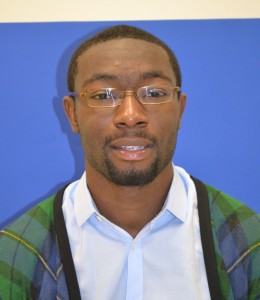 Ugonna Ohiri is a first year Senior majoring in Computer Engineering.
Ugonna Ohiri is a first year Senior majoring in Computer Engineering.
What sort of research are you pursuing? In my research, we propose an innovative method for standoff chemical detection, using the techniques of photo-acoustic sensing and high sensitivity microphone arrays for acoustic beam-forming and noise rejection. Acoustic beam forming is a technique used to detect signals along the formed beam while rejecting and filtering surrounding noise outside the regions covered by the beam. Similar to phase array antenna characteristics, we can form receiving beams using a 2D microphone array. The more microphone elements in the array, the narrower the receiving beam becomes (higher directivity). Our plan will be to use an array of 4 microphones and collect their signals simultaneously using a multi-channel A-to-D unit. The collected signals will be processed in real time with a delay time constant training section and will also achieve ambient noise cancellation and signal enhancement.
How long have you been doing this research? What inspired you to become involved and how did you become involved? I will be working as a first-year student researcher as part of the Undergraduate Research Award. My roommate is currently a returning URA Scholar and fellow Meyerhoff Scholar. He linked me up with his mentor to pursue a project that was in the realm of my research interests. After meeting with him about a potential project, I was even more excited for his vision, direction, and contribution to real-world applications.
Is this your first research project? I have been involved in several other research projects throughout my time as an undergraduate. I have successfully completed three other summer research experiences at three separate institutions.
How much time do you spend doing research? Instead of setting a fixed amount of time doing research, I do my best to set weekly goals for myself. I believe this technique allows me to take an engineering problem as a whole and attack the problem from its several sub-components.
Are you collaborating with any other students or faculty members? This year I will be collaborating with Dr. Choa in the Opto-Electronics and MOCVD laboratory. I will also be working with two other Computer Engineering undergraduates, Linh Pham and Sheriff Jolaoso.
Do you plan to become involved in URCAD? Or, are you being supported by any scholarships or fellowships? As a part of the URA, I plan to actively participate in the URCAD this upcoming spring. I plan to be presenting my research at the symposium and hopefully have a chance to present my work orally.
What is the best part of your research so far? The best part of my research so far is having the ability to think on my own two feet. There will be times where I come back from lecture and have a bright light sparked concerning my project. The better feeling I get is when I put my idea into practice and it actually works. Engineering requires a great deal of patience/trial & error.
What is the biggest obstacle you have faced while doing research so far? The biggest obstacle I have faced so far is assembling a definitive schedule for myself this year. I absolutely want to make sure I am taking full responsibility of my obligations and still make it a priority to enjoy my final year with my good friends at UMBC.
What do you hope to achieve with this research? At the end of the day, I plan to have a functioning project, which can serve as a stepping-stone for other future projects. When I mean functioning, we plan to place these arrays of microphones in an outdoor environment, filter out excessive noise, and achieve much better chemical detection performance.
Do you feel like this research is preparing you for post-college plans? I believe this research experience is preparing me well for graduate school. I am an advocate of having various types of experience and I believe doing my first one on-campus gives me a feel of how it will be in the graduate world.
What are your plans after graduation? My plans after undergrad are to pursue my Ph.D. in Electrical Engineering. I still have not narrowed my specific research interests as of yet but I will be applying to universities in the fields of MEMS, Signal Processing, or Electromagnetics.
*Ugonna was interviewed in September 2011.